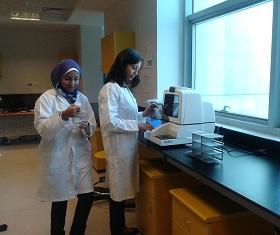Using AI to control energy for indoor agriculture
30 September 2024
Published online 8 November 2012

While unprecedented numbers of Arab women are flocking to study science and technology, they suffer gender discrimination in the workforce, according to a study published by The Economist Intelligence Unit.
In Saudi Arabia, women received 73% of the bachelor's degrees awarded in 2010, yet they comprise just 1% of researchers in the Kingdom. In the Occupied Palestinian Territories and Libya, they make up 19% and 22%, respectively, still far below the world average of 30%.
The report, Accelerating growth: Women in science and technology in the Arab Middle East, highlights the challenges of Arab women studying and working in science and technology.
Olfa Mahjoub, a senior researcher at the National Research Institute for Rural Engineering, Water and Forestry (INRGREF), Tunisia, contends many Arab women who complete their education are eager to pursue science careers as a form of self-fulfillment. "Some want to realize their own dreams and others are pushed to realize the dreams of their parents." A science career is also a means for better societal status and pay.
As plans to promote a shift to technology-based economies spread across Arab countries, the need for the presence of women within the workforce in science and technology cannot be ignored, stresses the report.
"Female enrolments in higher education in North African countries such as Morocco and Tunisia are higher than males," says Tanveer Naim, a consultant to the Organization of Islamic Conference's Standing Committee on Scientific Collaboration (COMSTECH). However, there are often fewer women working as scientists, and they are concentrated in the public sector.
The long-term solution is to make merit the sole consideration for employment.
According to the report, a rise in divorce rates in the region may be a factor driving women to pursue work careers in order to become financially independent.
Despite girls often outperforming boys in mathematics and science at school, women are not getting equal opportunities when pursuing research careers. This may be due to unfavourable work conditions.
Many women often find it difficult to balance family commitments with a busy career in research or pursuing postgraduate studies. "When they get married, women give up on a piece of their professional dreams to take care of their families, which become their priority," explains Mahjoub.
More than 30% of women in the Arab world are unemployed - a figure more than double the global average. They account for only 25% of the total workforce.
Middle Eastern societies rarely support women's ambitions to have a successful career and a family life, adds Mahjoub. Often, recruiters prefer men who will not need to take maternity leave.
According to the study, in Qatar, Syria, Bahrain and the United Arab Emirates, women cannot get maternity leave for more than 50 days. It proposes creating legislations to support female employees in the public and private sectors, such as offering flexible working hours or child care services to mothers.
"The long-term solution is to make merit the sole consideration for employment. However, presently women have to work hard to prove their worth," says Naim.
"Women should be trained and given tools and more opportunities to reconcile their careers and families. Society should be less prejudiced against women that choose a scientific career," Mahjoub suggests.
doi:10.1038/nmiddleeast.2012.156
Stay connected: